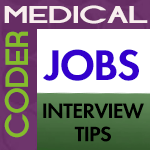It’s go time! You’ve written the cover letter, resume and now you’ve gotten a call to come in for an interview. You’re almost there.
Get the Inside Scoop on Medical Coding Jobs
To make it a little easier for you, we talked with a few employers to find out what types of questions they typically ask when interviewing for a medical coder position. Here’s what they had to say.
Liz Wilson, CCS, RHIT, CEMC, CPMA, Director of Coding and Auditing, Compliance Officer at Healthcare Solutions of WNY, Cheektowaga, NY, says that she tends to ask open-ended questions in order to assess the candidate’s initiative to research and to work independently.
Getting Medical Coding Jobs Advice

Tips for Acing Your Interview for Medical Coding Jobs
Open-ended interview questions have no right or wrong answers. In-depth responses are expected, along with a description or explanation. Here are some examples of open-ended interview questions and suggested answers:
• Tell me about yourself. The best way to answer this is to tell the employer how you are today; it should not be a recap of your resume.
• What is your greatest strength? How will this help you to perform the job? This is a great opportunity for you to connect your qualifications to the job being offered. Have some achievement stories ready in case the employer asks for examples.
• What is your greatest weakness? There are a few ways to answer this. You might wish to focus on a skill that is not really related to the job. For example, “I am not great at speaking in public, but I will do it if I have to.” You may also turn a negative into a positive. For example, “Organization was never my best trait, but in a previous job I implemented a time-management system that really helped with this.”
• How do you handle stress and pressure? Some good replies include: “I react to situations, rather than stress so the stress does not get the best of me;” “I deal with stress by exercising after work so it does not get out of control;” or I’m not a person who has a difficult time with stress. When under pressure, I focus and get the job done.”
• What motivates you? The employer is trying to get sense of why you are a good fit. This is a very personal answer, but some good answers to consider and make your own are: “I have always been motivated to do a good job;” or, “I enjoy succeeding and seeing those around me succeed as well.”
• What are you passionate about? Take this time to talk about something more personal so the employer can get to know you a bit more. For example, “I volunteer with my church and am passionate about helping others; or “I am an avid painter, and enjoy taking painting classes on the weekend.”
• Why are you the best person for the job? One suggestion is to tell them that you CARE. Several motivational speakers use this term. It stands for “commitment, awareness, responsiveness and exceeding expectations.”
“I also ask non-leading questions so I can get a better feel for the candidate’s views on meeting deadlines and on following a chain-of-command,” she adds. “I will ask questions that are directed at problem-solving when it comes to difficult situations regarding providers or colleagues.”
For example, some questions may include:
• What would you do if you received a rejected claim?
• What do you consider to be one of the most important skills for this job?
Wilson also tries to assess and evaluate the candidate’s readiness to use tools needed by coders. She asks candidates if they know what an encoder, LCD or NCD are; and what NCCI edits are.
“I will also inquire as to whether he/she has ever used spreadsheets, or is comfortable with e-mail communication,” Wilson says. “These questions typically help me to get a better picture regarding how independent he or she will be after hire.”
Melinda Kollin, Coding Manager at Anesthesia Business Consultants, headquartered in Jackson, MI says that she typically asks the following questions:
• What are your short-term goals?
• What are your long-term goals?
• How are you with working independently versus working with others?
• What do you do to be organized, detail-oriented, double check your work, etc.?
Alisha Ableson, Healthcare Recruiter, Harper Associates in Farmington Hills, MI says that she focuses on the nuts and bolts of the position. She asks:
• What specialties have you coded for?
• How long have you been coding?
• What is your accuracy rate?
• Are you a CPC with AAPC credentials?
“I mostly want to know about specialties, amount of experience, credentialing and schooling,” she says.
Carrie Young, BS, CPC, Manager, Coding Unit, Springfield Clinic, Springfield, IL likes to focus on quality and production-focused questions.
“It’s helpful if the applicant has previous work experience that had quality and production benchmarks (i.e., banking, insurance processor),” she says.
Finally, be yourself when looking for medical coding jobs. Dress professionally and know that they need you as much as you need them. Confidence is the key.
![[CCO] Certification Coaching Organization LLC [CCO] Certification Coaching Organization LLC](https://www.cco.us/wp-content/uploads/2015/05/CCO-Logo-2015-d3-500px.png)

These are great tips regardless of what field you are interviewing for, thanks! The CPC specific questions including accuracy and length of time coding are both good questions to have a quick and professional answer to.